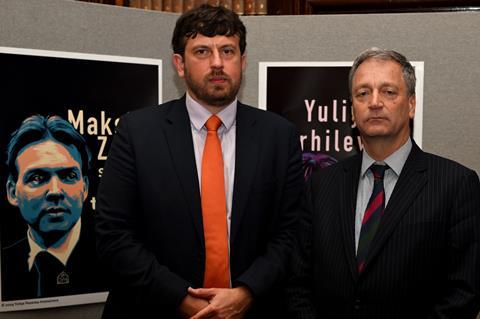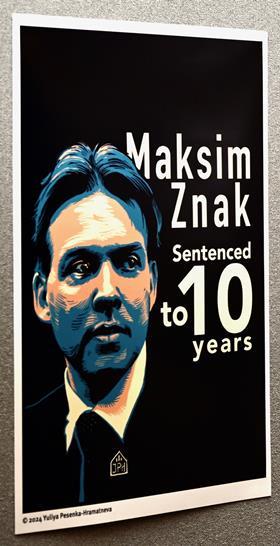A report published by the Coalition for the International Day of the Endangered Lawyer reveals 'a persistent and disturbing trend in Belarus where legal practitioners face escalating criminal sanctions, arbitrary detention and systemic interference in their professional duties.'
The case of Maksim Znak is just one example. The following is an edited extract from the coalition's report.
Maksim Znak is a former lawyer of the Minsk Regional Bar Association, and a former professor of law at the Belarusian State University. In 2020, he acted as legal representative to Viktar Babryka, the main opposition figure in the August election.
On 18 June 2020, while Viktar Babaryka was travelling to the election commission, he was arrested and taken into custody (ultimately resulting in his sentencing in July 2021 to 14 years in prison). Znak continued to provide him with legal representation and appealed against the authorities' refusal of his presidential campaign.

President Alexander Lukashenko, who has ruled Belarus since 1994, was re-elected on 9 August 2020.
After the elections, against a backdrop of mass protests and the violent repression of the protestors, the Opposition Coordination Council (OCC) was set up in an attempt to peacefully overcome the political crisis in Belarus. Znak was a member of the council's board of directors and its lawyer. He lodged an appeal with the Supreme Court to have the election results invalidated, arguing in particular that there had been irregularities in the vote count. By September 2020, all members of the board had been either arrested or forced to leave the country.
The State Prosecutor General initiated criminal proceedings against the council, describing it as a 'threat to national security'. Maksim Znak was summoned for questioning at the headquarters of the State Security Investigation Committee in Minsk, and then arrested on 9 September 2020 by masked men for 'calling for actions to undermine national security' . On 10 February 2021, two more serious charges were added: 'plotting to seize state power unconstitutionally' and 'creating and leading an extremist group'.

However, the indictment contains no details of the actions Maksim Znak is alleged to have taken, nor of any actions he may have intended to take in the future. There are no examples or evidence of calls for 'actions aimed at undermining national security' in the investigation documents. Dzmitry Layeuski, Znak's lawyer, stated the charges were retaliation for his 'professional activity, for expressing a legal opinion and promoting the rule of law'. Three months later, on 12 May the authorities declared that the investigation was closed and that Znak would be brought before a court, where he would face up to 12 years in prison. Znak went on hunger strike for 10 days during his eight months in detention to draw attention to his fate.
On 4 August 2021, after nearly 11 months in detention, the trial of Maksim Znak and another lawyer, Maria Kolesnikova, opened before the Minsk Regional Court. Znak pleaded not guilty. He was sentenced on 6 September 2021 to 10 years imprisonment.
Throughout the investigation and trial, the constituent elements of the charges were not made public. His lawyers had to sign a non-disclosure agreement. The court hearings were closed to the public. Maria Kolesnikova meanwhile was sentenced to 11 years in prison. On 24 December 2021, the Supreme Court upheld the sentences handed down to the two lawyers. The judgment stipulated that Maria Kolesnikova was to serve her 11-year sentence in a general security penal colony, but that Maksim Znak was to serve his 10-year sentence in a higher security penal colony. In February 2022, Znak was transferred from the pre-trial detention centre on Valadarski Street in Minsk to the penal colony Vitba.
The UN Working Group on Arbitrary Detention concluded in April 2022 that the detention of Maksim Znak violated several articles of the Universal Declaration of Human Rights and the International Covenant on Civil and Political Rights, deeming the actions against him as arbitrary.
Maksim Znak is now being held incommunicado. He is not being allowed to see his family, independent medical personnel, or his lawyers during his confinement.
The full report is available on the Law Society's website.































No comments yet